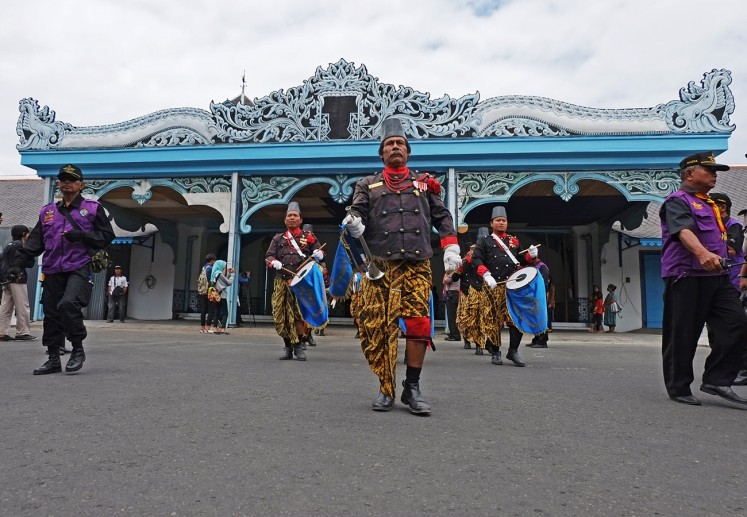Duck men of Tengkulak
On display: The beautifully crafted carved and painted ducks of Baliâs Duck Man, I Gusti Ngurah Umum
Change text size
Gift Premium Articles
to Anyone

On display: The beautifully crafted carved and painted ducks of Bali's Duck Man, I Gusti Ngurah Umum.
As a youngster growing up in the wood carving village of Tengkulak on Ubud's outskirts, Ngurah Umum learned to sculpt the masks needed in religious dances.
By his 20s, Ngurah's skill with chisel and wood had reached the level of an automaton. He was bored.
'I wanted to do more so I started training in painting on wood under Ida Bagus Sutarja over in Mas,' says the 59-year-old, before continuing to speak with a very Indonesian humility.
'I am sorry to say, but at that time I became quite talented and was painting the Rangda masks. I made all my own paints. I used ground pig bones for the white. Later on I was allowed to paint a carved Garuda [eagle], so my skill was developing,' according to Ngurah.
Years ago, a chance meeting with Joop Ave, then the director-general of tourism from the ministry in Jakarta, set Ngurah on a road to fame and fortune, carving ducks that have since been exhibited in Paris, Hong Kong and Jakarta.

'I was working at the shop of Pak Tilam in Mas. He had an art shop there. Pak Joop came in and asked what else I did.
'I said I carved and painted. Joop came back a couple of weeks later with two carved ducks he had bought in the Philippines. He asked if I could make these ducks and if so he'd come back in a month,' Ngurah says.
Within a year, Ngurah's works had developed a following among Jakarta's political elite. The support he received from Joop Ave never waned.
'He said if I was to put a sign outside my workshop, he would give me the name of the 'Duck Man of Bali',' says Ngurah.
He shared his fortune with other carvers in the village. Most of the men learned the art from their forefathers, carving masks just as Ngurah had.
'It's like learning to dance,' he says, 'Once you learn the Baris dance, for example, the next dance you learn becomes easier. If you have the technique [needed] to make one sculpture, you can make any sculpture.'
By the early 1990s, Tengkulak village was awash with ducks. Many in the community were making a good living crafting high quality sculptures.

However, changing tastes, a rise in commissions paid to local transport operators and unrealistic attempts to fulfill huge orders began to take their toll. The quality of the sculptures made by the community waned.
'I had a customer come who ordered 3,000 ducks to be crafted in three months - an impossible task that I refused. It was a job that would have killed me and the pay was so very low. I am not a factory so I never accept big orders,' says Ngurah.
Other craftsmen, however, took on the orders with less-than-stellar results, he says. 'The client came to inspect their work and broke off the heads of many of the ducks, saying the quality was too low.
Ngurah speaks in his workshop, surrounded superb and hard-to find specimens of his sculptured ducks, featuring life-like filaments of feathers and wings outstretched for flight.
'Guests here at the workshop are rare these days,' he says. 'I hear people say they have asked drivers to bring them to the Duck Man of Bali, only to be told there is no longer such a man. Can you believe it? There was one guy from Jakarta who had a driver ferry him around all day to every other place until he finally gave up at 10 p.m. and brought him to my door.'
While the collapse of the duck business has hit Tengkulak hard, carvers have not been bankrupted, he adds. 'They've just changed jobs.'
Dewa Putra, the youngest in a family of wood carvers, agrees. While his family's business in wood carving continues, he has diversified, opening a barber shop and a warung to ensure a stable livelihood.
'Dad started this business a long time ago and I started carving back in 1984 when I was still in primary school. The business was good then, carving ducks and other forms for sale. Over the past decade, business has gone down quite seriously. The price we need to ask to cover costs and make a living is more than people are willing to pay. So we now have to work in quantity, not quality to make ends meet,' says Dewa.
A hundred yards down the tree-lined main road of the village, 40 year old Made Arep sits, chisel in hand, carving out the herons that have become the flavor of the month. 'I stock a lot of suppliers in other parts of Bali, so that keeps me going. I make everything, including ducks, but the big orders these days are for herons.'
Few are as fortunate as Ngurah or Arep. Gusti Rio closed his wood carving shop back in 2011. 'People do not understand the price of wood. We are competing with builders and wood has become very expensive, so I see a lot of carvers have given up and become builders.'
Saddened by the economic shifts impacting the traditional culture and arts of the village, the carvers look to get by.
As Ngurah says, the carvers are just changing jobs.
' Photos J.B. Djwan









